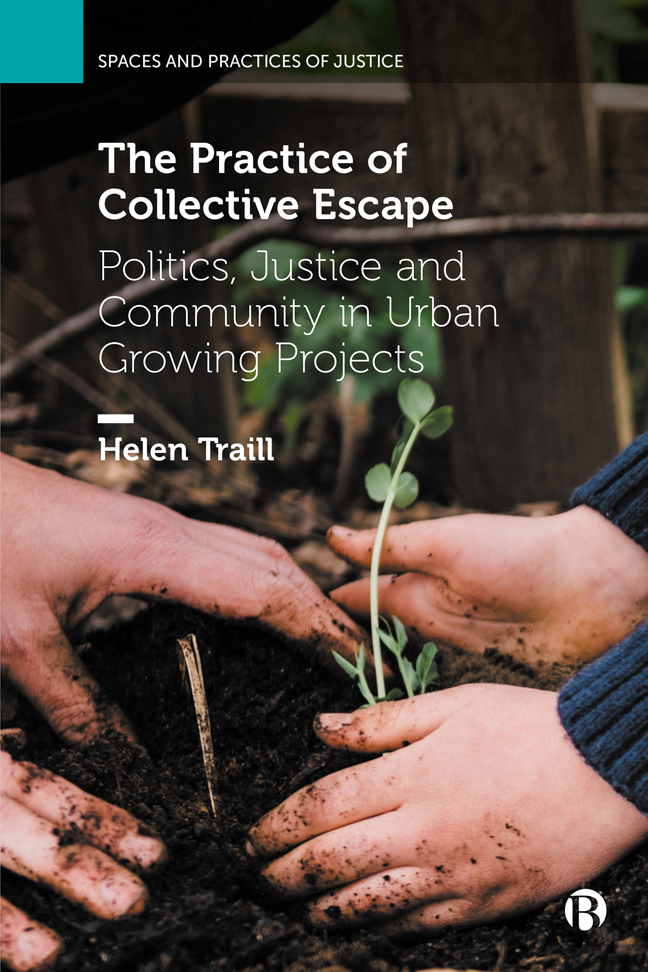Book contents
- Frontmatter
- Dedication
- Contents
- Series Preface
- Acknowledgements
- 1 Introduction
- 2 Urban Growing in Glasgow
- 3 The Rhythms of Urban Escape
- 4 Who Gets to Escape?
- 5 Ownership, Autonomy and the Commons
- 6 Escape into Responsibility
- 7 Field Dynamics and Strategic Neutrality
- 8 The Political Imagination of Common Justice
- 9 Escape, Crisis and Social Change
- 10 Conclusion
- Notes
- References
- Index
4 - Who Gets to Escape?
Published online by Cambridge University Press: 23 January 2024
- Frontmatter
- Dedication
- Contents
- Series Preface
- Acknowledgements
- 1 Introduction
- 2 Urban Growing in Glasgow
- 3 The Rhythms of Urban Escape
- 4 Who Gets to Escape?
- 5 Ownership, Autonomy and the Commons
- 6 Escape into Responsibility
- 7 Field Dynamics and Strategic Neutrality
- 8 The Political Imagination of Common Justice
- 9 Escape, Crisis and Social Change
- 10 Conclusion
- Notes
- References
- Index
Summary
Boundary work
‘In Woodlands is there not a bit of a, slight race thing?’
Howard (interview, June 2016)‘Some of [the meadow organizers] don't really know how to talk to people outwith their own social demographic.’
Craig (interview, December 2014)Although the spaces created at the North Kelvin Meadow and within the Woodlands Community Garden offer respite to some extent from a wide variety of pressures, this relies on boundary work. What makes escapist rhythms possible is a set of community practices that establish the collective basis for such rhythms. Reflecting on such practices foregrounds the uneasy payoffs central to communal growing projects; and thus makes space to consider the ways escape is an imperfect attempt to create just urban space. To do so, I begin from the ideology of inclusion and being ‘open’ that underpins the projects, taking it not as a fact or frame, but as a question. To whom are the projects open? Taking the case studies as contrasting organizations responding to specific sets of local dynamics, this demonstrates the vicissitudes of community as a practice of closure, indeed as a practice of boundary making and maintenance that reproduces class, race and gendered boundaries.
Community in sociological literature, though vexed and deeply fluid, has often spoken to the symbolic boundaries that emerge in the process of group formation across a variety of levels (see, for example, Cohen, 1985; Brint, 2001; Anderson, 2006; Belton, 2013). In discussions of belonging, which tend to focus rather more on the affective dimensions of communal life, identities emerge through contradistinction, as Benson and Jackson (2013) amply demonstrate. If community is situated then as something that is done, as a verb (Walkerdine and Studdert, 2015; Rogaly, 2016), then boundary making and maintenance are central to these social practices. Community is not a neutral thing that exists, but a set of dynamic practices that are replete with conflicting tensions. Situating communality as a central process and idea within urban growing (Traill, 2021), I argue that it is not an anodyne concept but a fluid boundary-making process with social and political ramifications for justice.
Taking justice as an everyday horizon towards which actors strive, the work of Fraser (2008) and Young (1990), although not entirely compatible, provoke the consideration not only of the distribution of resources, but also of recognition and process.
- Type
- Chapter
- Information
- The Practice of Collective EscapePolitics, Justice and Community in Urban Growing Projects, pp. 49 - 72Publisher: Bristol University PressPrint publication year: 2023



